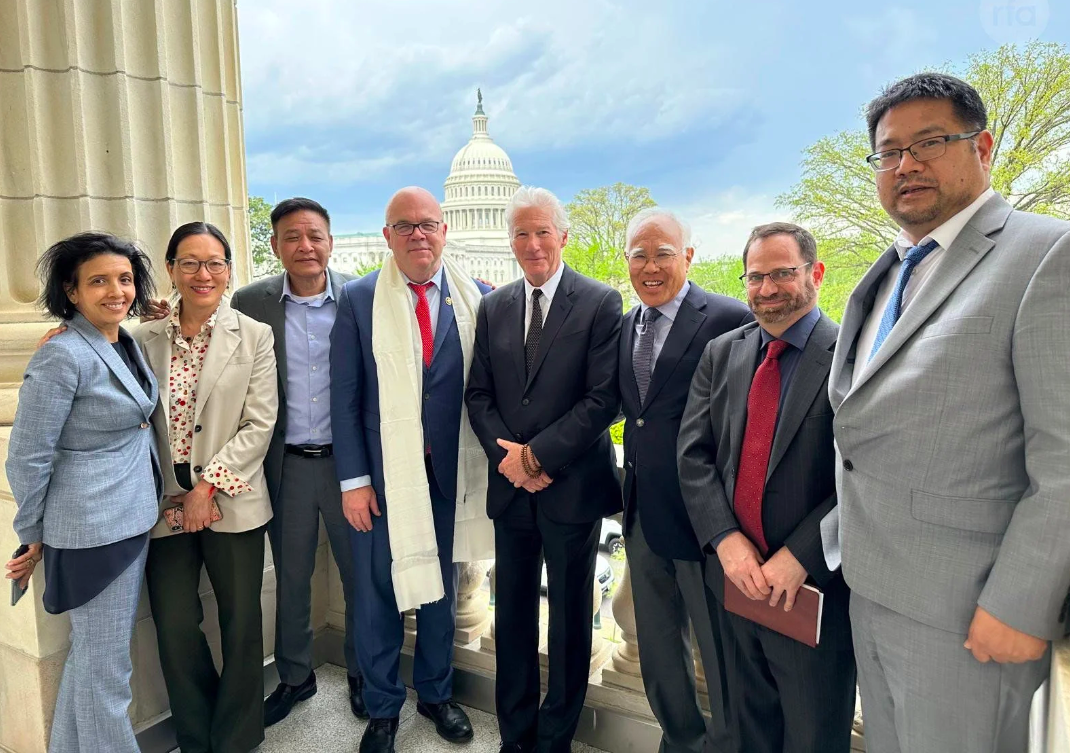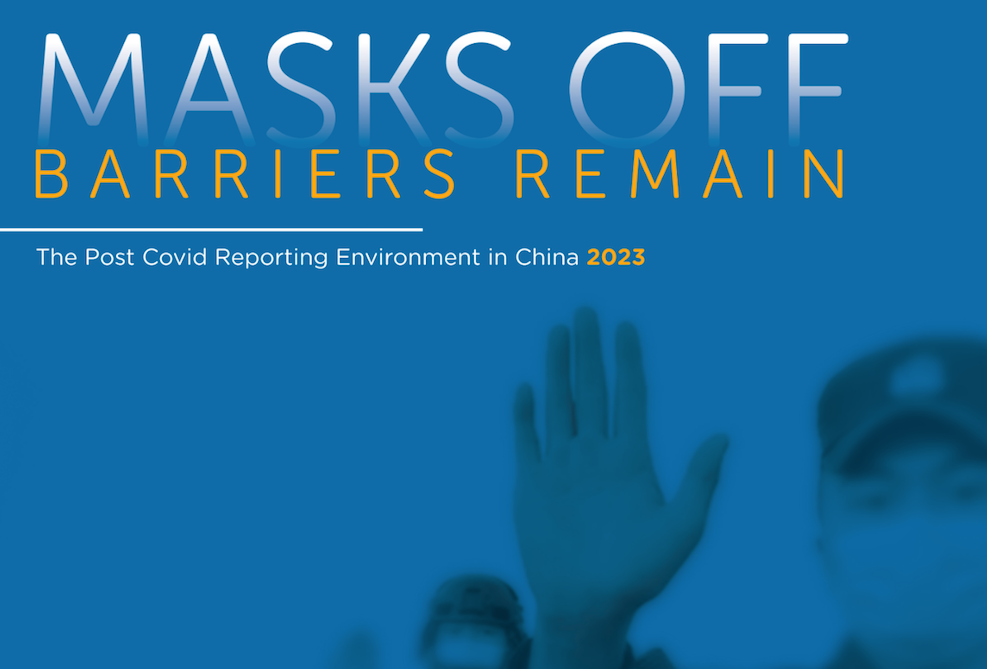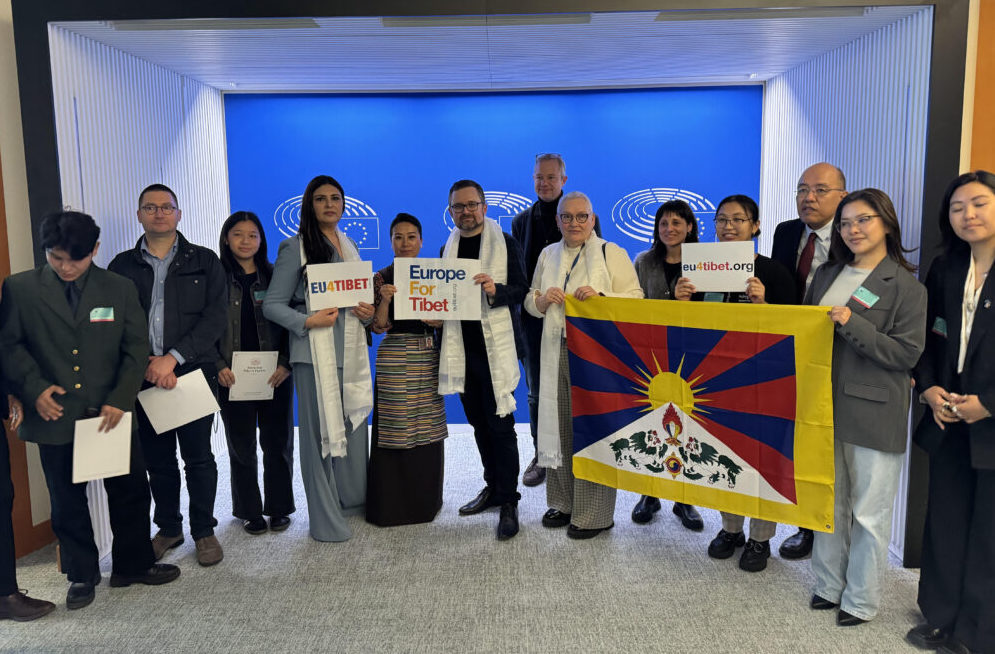 INTERVIEW WITH HIS HOLINESS THE DALAI LAMA-by Ewa Kedzierska
INTERVIEW WITH HIS HOLINESS THE DALAI LAMA-by Ewa Kedzierska
FOR GAZETA WYBORCZA, leading Polish daily
Dharamsala, April 4, 2007
(the interview was done for Polish language newspaper
The Tibetans call Him Kundun (tib. Presence). His Holiness the Dalai Lama, in His XIV incarnation (Tib. Ku-teng-Chushi-pa) spreads warmth and calmness, energy and wisdom. One feels with Him secured and exclusive. The Dalai Lama is the Sun and the whole room, with secretaries around us, is falling into a shadow.
Ewa Kedzierska: Your Holiness, before the Chinese invasion in 1949 Tibet was an independent country, with more than thousand years of history. We have eye-witnesses saying how much it has suffered under the Chinese occupation. Many Tibetans, as Tibetan Youth Congress, and also those from Tibet, want independence back. Your Holiness, why are You seeking only autonomy, and not independence? Do you believe that the policy of Tibetan Government in Exile (TGIE) really represents views of the Tibetans in Tibet? What is Your approach to the more radical Tibetans?
H.H. the Dalai Lama : – Our administration (TGIE) here is in a free country, and therefore I think, it can act as a representative of the majority of the Tibetans in Tibet. But those in Tibet who think realistically, most of them, agree with our approach, the policy of Middle Way, and support it. As far as the Diaspora is concerned, since 6 years we have full democracy, and my own position is that of a semi-retired. Our elections are every 5 years, and the Prime Minister Prof Samdhong Rinpoche was elected twice (2 terms of 5years) directly by the Tibetan people. Of course, for the next term a new person has to come, so let those, who have a different approach than ours, like the TYC make clear about their ideas and contest the elections and win. Then, majority of the Tibetan people, at least in exile, will decide want they want. But of course we appreciate these different views, different opinions; we are totally committed to democracy, to freedom of speech, freedom of thought. Then, the main reason why we are seeking the solution within the Chinese constitutional framework is that Tibet, as a vast land, rich of the natural resources in the past completely neglected modern education, technology etc… and was materially completely backward. Yet every Tibetan wants modernisation. So therefore it is our only interest to remain within the PRC. If they give us the meaningful self rule or autonomy, so then we can realise the material development with their help, while, at the same time, preserving our spiritual and cultural heritage and language. So there will be a mutual benefit, mutual interest. Of course, when more time pass without any concrete result in talks with the Chinese, it engenders more criticism and the frustration increases, so – we will see what will happen… (laughs).
Ewa: – Is there one or more Chinese policy on Tibet? Phuntsok Wangyal, a Tibetan communist (who led Chinese troops into Tibet decades ago) in three letters sent to President Hu Jintao condemned hawks for thriving on their opposition to You, Your Holiness and for blocking Your return home. “They make a living, are promoted and becoming rich by opposing splittism”, he said. Is there within the Chinese government a debate among the leftists, the hardliners and the more liberal lobby? What are the perspectives?
H.H. the Dalai Lama: – Yes, within the central government, among the top leaders, there are different views. So the central government itself is not clear about its policy. As far as the local level is concerned, as China is an authoritarian state, unless some blessing from the central government, the local authorities cannot act freely. They must follow wishes or instructions of the superior. Sometimes it looks a little contradictory: the local authorities’ behaviour and the central government’s altitude, but it is difficult to understand…, I don’t know.
Ewa: Methods to obtain whatever from China can be violent or non-violent. As a Buddhist, you are, Your Holiness, sincerely committed to Non-violence. However, the definition of this word should be clarified. Can You explain, Your Holiness, what, from the Buddhist point of view, violence is? Is a legitimate self-defence a violence? Does non reaction to a permanent violence not legitimate violence somehow? In what cases, following the Buddha’s teachings, violence is admitted?
H.H. the Dalai Lama: – Theoretically speaking Yes, violence or non-violence are methods. The motivation and the result are more important than the methods. So theoretically speaking, under certain circumstances violence could be possible or permissible. But then in practical level violence is always dangerous and negative. For me I feel it is absolutely essential not to go with violence. If things become desperate, majority of the people want violence, I will withdraw, resign.
Ewa: Your Holiness, would it be taboo, or politically incorrect, to ask the Dalai Lama about the potential insurrection in Tibet? I spoke with some politicians, who told me, that “they cannot help Tibet, because Tibet does not move”. Of course, we are aware of the objective conditions, yet, please, let me ask, these maybe extremely naive questions: – Would China morally survive – now – in the eyes of the world a massacre of hundreds of thousands of the Tibetan insurgents? Would the world ignore this up to refraining from any move? Does historical responsibility of the Head of State, towards past and future generations, not request sometime a sacrifice of human lives, in order to preserve, the national identity?
H.H. the Dalai Lama: – I think in the past at least few hundred thousand Tibetans sacrificed their lives, but what was the result? And equally, few hundred thousand Chinese lives also diminished. So one million people were killed. What did it bring? More oppression. And moreover if the Tibetan side kill few Chinese, then support or solidarity shown by Han Chinese will reduce. If there will be a real hatred between the Chinese and the Tibetan people, then this problem will remain forever. Up to now the Chinese people, as the Chinese people have a very close feeling with us, because we are strictly following non-violence. So more and more Chinese are now very critical about their own government policy. The governments change, yet the people always remain. So I consider the Chinese public support, public sympathy towards us is very essential. If the Tibetans create more bloodshed, since… it is not a civil war, bloodshed means the Chinese blood… beside, in Tibetan case violence would almost be like a suicide.
Ewa: Sometimes, suicide is also useful for obtaining something…
H.H. the Dalai Lama: – Oh, yes, very useful! (ironically)– look at Iraq, a lot of suicides, very useful! (laughs). Who will say these are useful?! Some mad people may say: – oh, useful: “hero”! That is short sighted thinking and full of emotions.
Ewa: But Your Holiness know the Polish history, only in two recent centuries, we had four major uprisings…
H.H. the Dalai Lama: (interrupts lively) – OK, Polish uprisings against Germany, against Russia…
Ewa: Against Prussia, against Austria…
H.H. the Dalai Lama: – Still! … Compare! Poland against Russia or the Germans and Tibet against China! You cannot make a comparison (laughs)!! We cannot compare! Israel small, Arab countries big…
Ewa: – But as Your Holiness understand, the future generations may say: “what did they(older generations) do? They could do something, but they did nothing”, and then our history now is not the same one century later! In the Polish uprisings many people died, therefore, we are now independent.
H.H. the Dalai Lama: – OK! (bursts into laughter) I don’t think that the Polish independence has just come from…the sacrifice of your people! I think there were other factors too! If the Soviet Empire still existed there, then Poland would still have remained under the Soviet domination. The collapse of Berlin Wall and of Soviet Union were the dominant factors, not the Polish people’s sacrifice alone! From The Buddhist, or realistic point of view, everything is interconnected, or interdependent. (laughs) So, it is difficult to generalise..
You have visited Lithang area. I think the elders told you: around 1956 there started an open revolt, first in Lithang, then in other Kham areas, then in 1957, 58 in Amdo areas, than 58, 59, in the Western Tibet (TAR). So finally the whole Tibet was in flames. The result? The number of people killed in military action according to the report of one Chinese military official, was 87’000 just between March 1959 and September 1960, and that is only around Lhasa area. And Amdo, Kham are more populated. Some entire nomads’ populations disappeared, included children. My first delegation in 1979, visited some of the places. The head of the delegation told me after that, in some villages he visited there were some villages whose entire population except women and very old men were wiped up. So few hundred thousand killed, a few hundred thousand died in the Chinese gulags, or in their own place due to starvation. And the result? Nothing happened. Just misery. More military actions. I think the losses on the Chinese side were bigger. In any way, the Tibetans who really struggled against the Chinese were in genuine sense heroic. But the result? More distrust, more fear of each other. Sometimes, I am telling my Chinese friends that before 1959, of course there were problems, and many Tibetans had a feeling of resentment. But it was not a racial resentment. It is because of Chinese behaviour, after ’59, it became the racial resentment. Every Tibetan child or Tibetan prisoner, Tibetan staff member, or party member, started to think: these are Han Chinese and we are Tibetans. Individually, maybe friends, but racially different. How it happens? Because of too much violence.
Ewa: – Yet, Your Holiness, there are the Tibetans in Tibet who still think in this way. In X, I met a man, who told me, that if You, Your Holiness, do not come back to Tibet, he will fight with arms, now. And he had just left a prison after serving 3 years sentence for selling arms. He was the ponpo (chief) of the village, one of the ponpos from X. When he was back from the prison there were 200 people welcoming and congratulating him with khatas.
H.H. the Dalai Lama: – Yes, there are such people. Recently, last year I met one Tibetan, I think he was in his 40’s, a party member. He told me that the Tibetans beyond 40, like 50, 60 are now more careful, but those below 40, have too much hatred, too much frustration towards the Chinese, so they say: for the time being, so long as the Dalai Lama remains, we have to follow non-violence, but after that…we will be free! That person told me like that. So this is the situation.
Ewa: They are waiting to be free, to fight.
His Holiness the Dalai Lama: – Yes! But I don’t think this is a right solution. But after all, the Tibetan issue is the Tibetan people’s issue, not my issue, automatically if they really want to follow violence – they will do! (laughs)
Ewa: And what about the Chinese increasing interest in the Tibetan Buddhism, will it change China and will it influence the Tibetan issue?
H.H. the Dalai Lama: – I don’t know whether this new trend, this new interest in the Tibetan Buddhism will influence Chinese policy or not, that’s difficult to say, it’s a bit too early to say. But in any case, it’s positive. I think the number of the Buddhists in China is over hundred million, and among them, the Han Chinese who follow the Tibetan Buddhism is well over a million. So, it’s good, naturally their attitude towards the Tibetans, will be very positive.
Ewa: But do Chinese people have or will have any influence on the Chinese policy, on the Central Government?
H.H. the Dalai Lama: – At the moment none. Chinese people, the majority, or I don’t know, it’s difficult to say, but at least a big portion of people want democracy, rule of law, free press.
I think the majority of Chinese is simply concerned with a daily life: refrigerator, or bicycle, house, like that. Those who are concerned with a daily life, they want more stable government. It does not matter, whether it is democratic or authoritarian, as long as it provides their daily bread and butter…
Ewa: What significance does China’s booming economic growth have for Tibet and the world?
H.H. the Dalai Lama: – China is a poor and populated country, so economic development is good. But meantime, the Chinese military development is also increasing. That increase engenders more fear, more doubts, especially in the neighbourhood states, including India, Japan, and eventually US. I think Poland is not in a direct danger (laughs). But Poland is an important member of EU, so your voice also makes a difference. Anyway, one thing I am always telling people: that the democratic China with a free press is in interest of everyone and that is very important. Once China becomes an open society, with the rule of law, than China becomes more predictable, and this will be of an immense benefit for everybody. It will reduce fear. Otherwise what? The authoritarian military power, including military weapons means a danger, not only for 6 million Tibetans, but for the whole planet, 2.5 billion human beings. For example. to improve Sino-Indian relationship (what China wants to obtain), the Tibetan issue is very essential. The present Chinese policy regarding Tibet is just suppression, Rule of terror. With this policy the Tibetan issue, or the Tibetan resentment will remain forever. This means the Chinese soldiers have to station in Tibet forever. That brings more suspicion in the mind of India. This is logical. China wants to have close relations with India, but at the same time ignores the Tibetan problem, so it has to keep large number of Chinese soldiers next to the Indian borders. This is contradictory.
Ewa: Your Holiness, “the peaceful” world admires You as the winner of Nobel Prize for Peace. What is a definition of “peace”? Is it just an absence of war?
H.H. the Dalai Lama: – Of course not! Look at Poland – no violence, but there is not a genuine peace. – No fear, more friendship, more harmony, more equality, same opportunities for everybody – perhaps this is the meaning of the peace?
Ewa: What benefit can the supporters of Tibet take from the forthcoming Olympics 2008?
H.H. the Dalai Lama: – Olympics is one opportunity but don’t put all hopes on Olympics. It means if nothing happens, then we have also to continue what we are doing…
Ewa: Your Holiness repeats You are nothing more (or less) than a Buddhist monk. Yet, 6 million Tibetans and enough of others think differently. Are they all just making projections of their own visions and wishes?
H.H. the Dalai Lama: (laugh) – Yes, mainly. Then?…
Ewa: Your Holiness, what would you say to the Western “Buddhists” for whom the Tibetan political issue is completely distant from the religion, which they have so enthusiastically adopted?
H.H. the Dalai Lama: (lively and with determination) – Oh, that is wrong! Tibetan freedom is very much linked with the Tibetan Buddhism. Without Tibetan freedom, the Tibetan Buddhism cannot survive.
Ewa: Thank You, Your Holiness.
With grammatical editions by phayul









